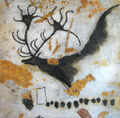Comics (nonfiction): Difference between revisions
No edit summary |
No edit summary |
||
| Line 30: | Line 30: | ||
* [https://en.wikipedia.org/wiki/Comics Comics] @ Wikipedia | * [https://en.wikipedia.org/wiki/Comics Comics] @ Wikipedia | ||
* [https://boingboing.net/2018/10/09/transmet-and-beyond.html Warren Ellis on the unique narrative power of comics] | |||
External links, specific: | External links, specific: | ||
Latest revision as of 10:13, 9 October 2018
Comics frequently takes the form of juxtaposed sequences of panels of images. Often textual devices such as speech balloons, captions, cartouches, and onomatopoeia indicate dialogue, narration, sound effects, or other information. Size and arrangement of panels contribute to narrative pacing.
Since the late 20th century, bound volumes such as graphic novels, comics albums, and tankōbon have become increasingly common, and online webcomics have proliferated in the 21st century.
Scholars have posited a pre-history as far back as the Lascaux cave paintings.
In the News
Lascaux cave paintings tell it like it is.
Algorithmic speech balloons harvested in record number, thanks to freshly enumerated Diagramaceous soily.
Comics Code Authority symbol unemployed, will assert censorship authority for food.
Fiction cross-reference
Nonfiction cross-reference
External links, general:
External links, specific:
- Anomalies @ Virus Comics





